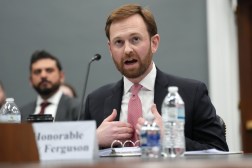Hayden: Congress must act on crypto fight
The former head of the National Security Agency and Central Intelligence Agency says Congress must resolve the bitter battle waged between Apple and the FBI over unlocking the encrypted contents of an iPhone used by a gunman in the San Bernardino attack.
Retired four-star Air Force Gen. Michael Hayden said Wednesday that a bill from Congress would be better than the law being used right now to try and compel Apple’s compliance with the FBI — the 227-year-old All Writs Act.
“Right now, the Bureau is asking the court to impose something on Apple based on a statute written in 1789. Let’s take another look,” Hayden said at the Adobe Digital Government Assembly. “These are hard choices. Free people should decide where it is they want to be, so let’s just have that open debate.”
There are at least two approaches being taken in proposed legislation.
The top two members of the Senate Intelligence Committee, Sen. Richard Burr, R-N.C., and Sen. Dianne Feinstein, D-Calif., are pushing for a bill that would require companies to unlock phones under court order.
Alternatively , Sen. Mark Warner, D-Va., and Rep. Michael McCaul, R-Texas, announced Wednesday they will introduce a bill next week to create a national commission that would examine the privacy and public safety implications of free and widely available apps that offer end to end encrypted communication.
‘My fear is we’re talking past each other,’ Warner said during an event at the Bipartisan Policy Center Wednesday. ‘This is not going to get fixed if we keep doing that.’
Earlier this week, in interviews about his newly published memoir, Hayden stated that he was for robust encryption, a position he reiterated with FedScoop Wednesday.
“Looking at this just through a security lens, I actually think the best way to make America most secure is with unbreakable, end-to-end encryption with no backdoors,” Hayden said.
“Now I get it, that makes the job of law enforcement more difficult in specific circumstances, even makes intelligence a bit more difficult, but I believe the heaviest hand falls on law enforcement because they obviously have more limits on alternatives that intelligence can go after.”
[Read more: In memoir, Hayden slams NSA leak probe]
Despite his support for strong encryption, Hayden said he doesn’t necessarily accept Apple’s stance that complying with the FBI will lead to back doors that would leave billions of devices open for malicious attacks or government eavesdropping.
“If that’s true, then with Tim Cook and Apple, the burden of proof is on them,” Hayden said. “So on this specific case, I’m shading in the direction of the Bureau, where at the macro level, this is a pretty clear choice [for end-to-end encryption].”
Hayden noted that for the past three years, Director of National Intelligence James Clapper had identified potential cyber attacks — which require strong encryption to defend against — as the number one threat facing the U.S. Whereas terrorists and transnational criminals, who can now use strong encryption to defeat law enforcement, were assessed as lesser threats.
The argument for backdoors was ‘shaving points’ from the greater threat to deal with the lesser one, he said.
Hayden also said remarks by Manhattan District Attorney Cyrus Vance, Jr. about Apple needing to comply with his request to open 175 devices is not helping the FBI’s claim that the San Bernardino case is a one-time request.
“The bureau hasn’t helped by claiming this is a one-off, and you have the U.S. Attorney in Manhattan saying, ‘By the way, when you are done with that thing in California, I have 175 more of these in the back room,’ that undercuts the one-off nature of the FBI’s argument,” Hayden said.
The former NSA chief admitted that the result of any forthcoming legislation might not satisfy all parties involved, but said it’s a discussion worth having.
“I may not be happy with the legislation that comes out of this,” Hayden said. “Tim Cook may not be happy. Jim Comey may not be happy. I don’t know where it comes out. But let’s have at it as an adult nation.”






